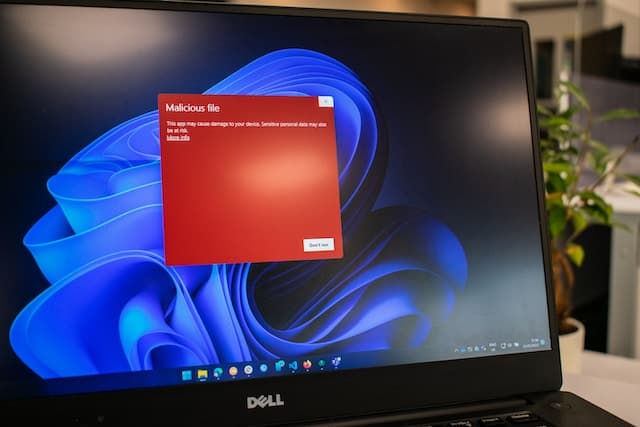Online privacy has become a major concern in the digital age. As technology advances, it is increasingly important to understand and protect your online data from being exposed or misused.
This article aims to provide an overview of what online privacy entails and best practices for protecting it. It will cover topics such as using strong passwords, employing virtual private networks (VPNs), monitoring activity online, encryption, and understanding the rights and responsibilities associated with sharing data online.

Understand What Online Privacy Is
Online privacy can be likened to a fortress, in that it is an individual’s responsibility to build and maintain the walls of protection around their personal information.
Online privacy refers to the ability of individuals to keep their data safe from tracking, monitoring, or other forms of exploitation. It involves making sure one’s browser history is not easily accessible by third parties who may use it for malicious purposes.
As such, it is important to understand online privacy and how best practices can help protect one’s data.
When dealing with online privacy, there are several steps that should be taken in order to ensure maximum protection. These steps include regularly deleting cookies and browser history, using private browsing mode when available, disabling location services on devices, and being aware of what types of websites allow tracking or collecting personal information.
Additionally, using strong passwords and two-factor authentication can also help secure accounts against unwanted access from outside sources.
It should also be noted that some browsers have built-in features designed to help users protect their online data as well as limit exposure to external threats such as malware or other malicious attacks. Taking advantage of these tools can provide an added layer of security for one’s digital activities while browsing the web.
Ultimately, having a good understanding of online privacy best practices will go a long way towards ensuring one’s data remains secure at all times while surfing the internet.
Use Strong Passwords
The use of strong passwords is critical to ensure the security of digital accounts. Passwords are the first line of defense against unauthorized access and should not be underestimated or taken lightly.
In order to protect valuable information and digital identities, it is important for users to create secure passwords that cannot be easily guessed by malicious actors:
- A password should contain a combination of upper and lowercase letters, numbers, and symbols;
- It should also be at least 8 characters long;
- Passwords should be unique for each account;
- They should also be changed regularly.
Using two-factor authentication (2FA) is another way to bolster password protection. 2FA requires users to provide two pieces of evidence in order to gain access such as an additional code sent via text message in addition to a username and password. This creates an extra layer of security and can help prevent intrusions from hackers.
Additionally, using a trusted password manager can help generate secure passwords that are difficult for cyber criminals to guess or crack while still allowing users easy access with one master password.
Use a Virtual Private Network (VPN)

Using a Virtual Private Network (VPN) can be an effective way to protect sensitive data and secure online activities from hackers. According to a 2020 report, 39% of internet users use a VPN for enhanced security and privacy while browsing the web.
A VPN is a network of computers that allows users to remain anonymous by encrypting their IP address, meaning their exact location cannot be tracked. This helps to prevent unauthorized access by third parties such as advertisers or hackers who may try to intercept data transmissions in order to steal personal information or money.
Additionally, using a VPN provides anonymity, as it masks the user’s identity while they are online. This makes it much harder for cybercriminals to identify them and target them with malicious attacks.
The security provided by VPNs also ensures that traffic is sent over an encrypted connection which prevents man-in-the-middle attacks or other forms of interception. As such, any data sent over the network is kept safe and secure from prying eyes.
Furthermore, most modern VPN services come with additional features such as malware protection and ad blocking which further add to their effectiveness in providing security against malicious actors on the web.
Finally, utilizing a reliable VPN service is essential for anyone wanting to maintain both their online privacy and safety while surfing the web. With its combination of anonymity, encryption protocols, and added features such as malware protection, using a Virtual Private Network should be an integral part of any user’s online safety strategy in order to guard against threats posed by malicious actors on the web.
Be Careful What You Share Online
It is essential to be aware of the potential risks associated with sharing private information online. When browsing the Internet, it is important to remember that what goes on the web stays on the web and can never truly be deleted. Therefore, it is wise to share information online wisely:
- Avoid posting personal details such as addresses and phone numbers online.
- Do not post content which could damage your reputation or that of someone else, such as gossip or slanderous comments about people or organizations.
- Be cautious when using social media sites like Facebook and Twitter by adjusting privacy settings and monitoring who can access your profile page.
- Never provide credit card information or other sensitive data unless you are certain that the website is secure and trustworthy.
It is important to understand how easy it is for others to access personal data online in order to make informed decisions about what should be shared and what should remain private at all times.
By being aware of these potential risks, individuals can take steps to protect their privacy while still taking advantage of all that the Internet has to offer.
Read Terms and Conditions Carefully

Understanding and adhering to the terms and conditions of online services is a critical step in ensuring digital security. It is essential for users to take the time to read through the privacy policies and other documentation associated with each service they use before agreeing to anything. Users should review these documents carefully, as it serves as an agreement between them and the website or application.
Understanding how their data will be used, what information is collected, and who has access are all important considerations when deciding whether or not to agree to a particular set of terms and conditions.
Monitoring one’s own online activity is also important in protecting their privacy. Keeping track of any personal information they share on social media sites can help prevent it from being misused by third parties or malicious individuals. Additionally, monitoring what websites one visits, what type of content they post, and any changes made in terms of privacy settings can help ensure that their activities remain private.
Finally, users should be aware that terms may change over time due to updates or legal requirements so it’s important for them to regularly check back on agreements with each service provider where applicable in order to remain informed about any new developments which might affect their privacy rights.
Be Wary of Phishing Attacks
@ Midjourney AI Image Prompt: /imagine prompt:Depict a hand cautiously reaching over a laptop keyboard towards a bright red fishhook, hovering above the keys. –v 5.1 –ar 16:9
When reading through the Terms and Conditions of any online service, it is important to be aware of the potential risks that come with using such services. While these documents can shed light on how a company will use and protect your data, there are other threats posed by malicious actors online.
One such threat is phishing attacks. Phishing attacks occur when criminals attempt to gain access to personal information or financial details by posing as legitimate organizations.
In order to stay safe from phishing attacks, it is important to stay alert and recognize the signs of suspicious activity. These include emails that appear to be from trusted sources but contain strange requests or links, emails with generic messages lacking specific details about you or your account, and unsolicited offers for goods or services. If you receive an email like this, it is best to avoid clicking on any links within it and instead contact the organization directly.
It is also important to avoid responding to any suspicious messages in order for scams not become successful; if a message appears too good to be true then it likely is. Additionally, when dealing with financial matters online always make sure that the website uses encryption technology so that your information remains secure while being transmitted over the internet.
By following these simple precautions one can help ensure their safety and privacy while browsing online.
Use Antivirus Software

Protecting yourself from online threats requires the use of antivirus software to ensure maximum security against malicious actors. It is important to be aware that many malware and viruses are constantly being created, so it is essential that your virus protection program is updated regularly. This will help you detect any new malware or viruses before they have a chance to damage your system.
Additionally, it is beneficial to look for added features in antivirus software such as tracking cookies protection and malicious URL blocking.
Antivirus software can also provide additional security benefits such as firewalls, which protect you from external attacks by monitoring incoming and outgoing traffic on your network. These tools can also monitor system changes and alert you if any suspicious activity takes place on your computer. Furthermore, they can also scan downloaded files for potential malicious content before allowing them to be opened or installed on your device.
It is important to understand that while anti-virus software offers an essential layer of protection against online threats, it cannot guarantee total safety from all types of cyberattacks. Therefore, users should still practice caution when browsing the internet and downloading files or applications from unknown sources in order to minimize their risk of attack or data theft.
Monitor Your Online Activity
Continuing from the previous subtopic about using antivirus software, monitoring online activity is a necessary step to protect personal data and safeguard one’s identity. In order to do this, it is important for users to be aware of their online behavior by keeping track of what websites they visit, information they share, as well as any emails or messages that are exchanged.
By doing so, users can get an accurate picture of how their personal data is being used and where it may be at risk.
In addition to tracking activity online, it is also important for users to be mindful when sharing content on social media platforms or other public websites. This includes refraining from posting confidential information such as passwords or account numbers in order to protect against potential hackers who could use this information to access private accounts. Being aware of the type of content shared and posted can help safeguard data and protect one’s identity from malicious actors.
Finally, making sure all downloaded programs are legitimate sources is another way of keeping personal information safe while also preventing malware from infiltrating computers and devices. It is essential for users to double check the source before downloading anything in order remain secure online while still enjoying the convenience provided by technologies like smartphones and laptop computers.
Use Encryption

Utilizing encryption is an important step toward safeguarding personal information and data when engaging in online activities. Encryption is the process of transforming plain text into unreadable code for secure transmission and storage, limiting access to authorized personnel only.
Encrypting data provides a protective layer against malicious actors seeking to steal information or manipulate it for their own gain.
In order to take advantage of encryption technology, users must practice backup procedures that include creating strong passwords with two-factor authentication enabled, using a secure connection such as Virtual Private Network (VPN), and encrypting sensitive documents before sending them via online communication platforms.
Backups can help restore valuable data if it becomes lost or corrupted due to malicious attacks or natural disasters.
Considering the benefits of encryption, it is essential for all users to be aware of the security measures they need to take in order to protect their personal information and data from unauthorized access while engaging in online activities. Taking these steps helps create a secure environment where users can safely store and transmit confidential information without fear of being exposed to malicious actors.
Know Your Rights and Responsibilities
In order to ensure online security, it is important for users to understand their rights and responsibilities related to the protection of their data. This includes knowledge of laws surrounding privacy, such as those protecting personal data from unauthorized access or use, as well as understanding that user-generated content may be tracked and monitored by certain parties.
Furthermore, users must also be mindful of potential threats posed by malicious actors who may seek to gain access to private information for nefarious purposes. To this end, being aware of these risks and taking proactive steps such as encrypting sensitive files can go a long way in protecting one’s data from unauthorized access or use.
Another responsibility regarding online privacy involves keeping track of digital activities and monitoring any changes that might suggest a breach in security. Regularly updating passwords and other authentication measures are essential steps in mitigating risk against phishing attempts or malicious software attacks. Additionally, utilizing services such as two-factor authentication can help provide an extra layer of security against unauthorized access attempts.
Furthermore, users should also remain vigilant about what they share online and where they share it, since malicious actors often target places like social media for harvesting personal data.
Overall, understanding one’s rights and responsibilities surrounding online privacy is paramount when seeking to protect oneself from potential threats posed by malicious cyber criminals. By taking proactive steps such as using encryption technology or regularly monitoring changes in digital activity patterns, users can greatly reduce the chances that their data will fall into the wrong hands.
Ultimately this knowledge serves as a valuable tool in helping individuals keep their private information safe from unwanted intrusions into their digital lives.
Frequently Asked Questions
What are the legal implications of online privacy?
The legal implications of online privacy refer to data protection and privacy laws. These laws ensure that personal information is not misused or shared without consent, and impose penalties for violations. They are important for protecting users’ rights and ensuring compliance with regulations.
Should I be concerned about online privacy when using public Wi-Fi?
One must be ever-vigilant when using public Wi Fi, as it often lacks the necessary data encryption and security to protect users’ privacy. Hence, it is imperative to employ best practices such as encrypting any sensitive data or using a Virtual Private Network (VPN) for added security. To ensure online privacy in this digital age, one must remain cautious and informed of the risks associated with free public Wi Fi networks.
How can I know if a website is secure?
To discern if a website is secure, it is important to check its privacy policies and look for data encryption technology. Researching the website’s reputation can also provide insight into its security measures. Taking these steps can help users make informed decisions about their online safety.
What is the most secure way to store my online passwords?
Password protection need not be perplexing: password managers and encryption are expedient, effective methods for securing your sensitive information.
What is the best way to protect my personal data while using online services?
Protecting personal data while using online services requires vigilance in managing one’s online identity and being aware of data tracking. Taking proactive measures such as regularly changing passwords, using two-factor authentication, and limiting access to personal information can help ensure privacy.
Conclusion
Online privacy is an important right that should not be taken for granted. It requires careful consideration and constant vigilance to ensure personal data is protected from malicious actors.
To maximize online privacy, individuals must use strong passwords, virtual private networks (VPNs), encryption, antivirus software, and be aware of their rights and responsibilities.
A 2019 study has found that over 40% of people surveyed did not believe they had the necessary skills or knowledge to protect their online privacy. This statistic emphasizes how vital it is to educate oneself on best practices for online privacy protection.
With education and mindfulness, individuals can take the steps necessary to protect their data from potential threats.
- The Evolving Threat Securing the Final Layer: How Screen Watermarking Protects Organizations from Insider Threats Landscape in ASEAN - October 8, 2025
- The Camera Set That Makes Tracking Real: Discover What It Does and Why You Need It - October 2, 2025
- Trending Trousers: The Must-Have Styles for Women - September 26, 2025